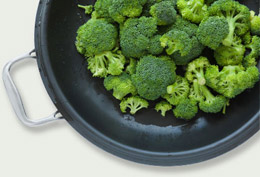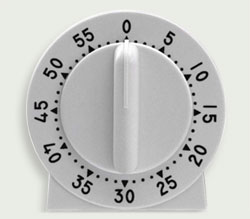
Preparing and cooking vegetables for optimal taste and nutrition
Posted in Diet & Nutrition on February 10, 2012. Last modified on February 01, 2018. Read disclaimer.
Cooking vegetables (or fruits) is a bit of a tradeoff. To roast, bake, saute, steam, stir-fry or microwave may make them more appetizing (or even edible, in the case of legumes) but the cutting, cooking, storing and serving also destroys some of the valuable nutrients.
+ Free Shipping & Returns on Eligible Items.
(*Amazon's Top 100 list updated hourly.)
It is important to know that:
- Water soluble vitamins (like vitamins C and B complex - thiamine, riboflavin, niacin, folate, B6, B12) and minerals are susceptible to water, light, air, heat and ph factors (such as adding baking soda to greens to preserve color). Water soluble vitamins are not stored in the body (they are eliminate through urine) so they must be consumed daily through diet or supplements.
- Fat soluble vitamins (like A, D, K and E) are more stable -- though still vulnerable to being destroyed by air exposure. Fat soluble vitamins can be stored in the body's fat tissues.
To make certain the vegetables you eat are as nutritious and appetizing as possible, be mindful of:
1. Freshness
- Avoid buying no more fresh produce than what will be eaten within a couple days.
- Consider buying frozen or canned berries or other fruits (especially those that are out of season) as they may be less expensive and higher quality.
- Always keep frozen or canned produce on hand which can be stored longer than fresh produce and is faster and easier to prepare in a pinch. (Frozen fruits and vegetables are already washed and canned goods are both washed and already cooked, so they require only warming.)
2. Storage
- Hardy produce such as carrots or apples can be refrigerated for a month or more but, as a general rule, refrigerate at all times and try to consume produce within a couple days.
- Unripened fruits (peaches, tomatoes) can be stored at room temperature in a paper bag (which traps the ethylene gases fruits give off naturally) and they will continue to ripen.
- In the refrigerator, store fruits and vegetables in separate crisper containers. The gases produced by some fruits will shorten the shelf life of some vegetables.
- Keep frozen foods frozen and store dried fruits and vegetables away from light, air and humidity.
3. Water
- When washing vegetables, use cold water and do not allow them to soak. Otherwise, you may lose some of the water-soluble vitamins in washing.
- When boiling or steaming, use a minimum of water; then recycle that water into soups.
4. Heat
- Do not overcook. Perfectly cooked vegetables should be brightly colored and just tender - still having a bit of a crunch to them.
- Prepare foods in small amounts that will be eaten promptly. When practical, avoid cooking large volumes of food which requires longer exposure to heat.
- Cooked foods that will not be eaten promptly should be quickly cooled and refrigerated.
- Eat raw produce as much as possible.
5. Light
- Store foods in light-safe containers or away from light. (This rule also applies to milk and grains.)
6. Air
- Keep sliced, chopped produce in larger pieces, when practical, to avoid unnecessary air exposure. (We often select the smallest yams and squash so that single-serving size ones can be baked quicker and without cutting.)
- Cook fruits and veggies promptly after cutting.
- Serve prepared foods promptly. Try to avoid having prepared foods sit for more than 15 minutes before serving.
- Store uneaten prepared foods in air-tight containers and refrigerate.
7. pH Balance
- In order to retain water soluble vitamins like C and B complex, do not add baking soda when cooking vegetables.

Left: If needed, use a timer to avoid overcooking veggies!
For additional vegetable cooking tips and information, visit:
http://www.fns.usda.gov/tn/resources/blocks5.pdf
http://www.cancer.gov
U.S. Department of Health and Human Services and U.S. Department of Agriculture. Dietary Guidelines for Americans, 2010.
www.ext.colostate.edu/pubs/foodnut/09312.html

